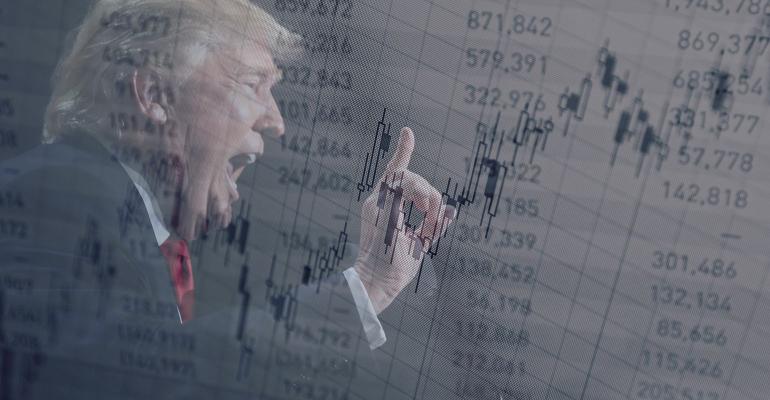By Stephen Gandel
(Bloomberg Gadfly) --One of the most famous phrases of Benjamin Graham, the legendary value investor and teacher of Warren Buffett, is that over the short term the market is a voting machine, and over the long term it's a weighing one. So by Graham's logic, it's unsurprising that the stock market over the past 14 months has given the thumbs up to the winner of the presidential election.

Nor is it unusual. Stocks have generally climbed during presidents' first year in office, a few times even more than they have under Donald Trump. The market would most likely have gone up under Hillary Clinton as well if she had been victorious. That's how sentiment works. It can take a while before a president's policies begin to shift the broad direction of the market.
Still, given the size of the increase in the first year of the Trump administration, it's hard to argue, no matter your political leaning, that Trump has not been good for the market. Yes, earnings growth topped expectations, and much of that increase was propelled by a surge in economic activity overseas. But the price-to-earning ratio of the stock market has swelled, from 20 right before the election to 23 today, meaning investors think the good times will continue under Trump, or at the very least he will do little to impede them.
What's more, while at times it seemed as if "Trump stocks" were missing the market bump the president was taking credit for, at the close of his first year in office, it does appear, at least from the bird's-eye view, that the promises Trump made on the campaign trail have played out in the market. Consumer discretionary stocks are up, by 29 percent since the election, signaling that investors believe the average American has more money to spend, or soon will have. Also up are the shares of industrial and material companies, sectors that also do well when the economy is strong. It's not truly clear yet how Trump's policies so far have boosted those sectors or the economy. The tax cuts will bolster corporate profits, but those don't kick in until this year, though the market and investors have most likely priced in much of the benefits already.

Trump also vowed to slash regulations that he said were hurting businesses, especially those put in place by his predecessor. The sector that experienced the biggest increase in regulation under President Barack Obama was Wall Street, so perhaps it's no surprise that financial stocks have been one of the biggest gainers since Trump took office.
Not as obvious, or expected, was the huge gain -- the biggest of any sector -- in the shares of technology companies, many of which, including Apple Inc. and Amazon.com Inc., Trump attacked during the campaign. He hasn't been a big fan of alternative energy, yet shares of Tesla Inc. are up 76 percent since the election. One explanation is that many investors expected Trump to be a lot worse for those stocks. He has not yet imposed many of the immigration and trade restrictions that he threatened and that Silicon Valley, along with other industries, oppose. The same can be said of the gain in the health care sector.

Tech never really seemed to swoon after Trump was elected, so it's difficult to frame its gain as a relief rally. The best explanation, despite all of the promises to reshape America, is that Trump really hasn't rejiggered the economy all that much. Technology stocks were the biggest sector of the market when Obama left office, and they still are. Industrials are still a much smaller portion of the market than they were three decades ago. In fact, under President Obama, 27 percent of the market's gains went to technology companies. It's nearly identical under Trump, for that sector and nearly every other. Trump may have made the market greater, in his mind, but the greatness is still coming from the same places.
This column does not necessarily reflect the opinion of Bloomberg LP and its owners.
Stephen Gandel is a Bloomberg Gadfly columnist covering equity markets. He was previously a deputy digital editor for Fortune and an economics blogger at Time. He has also covered finance and the housing market.
To contact the author of this story: Stephen Gandel in New York at [email protected] To contact the editor responsible for this story: Daniel Niemi at [email protected]





